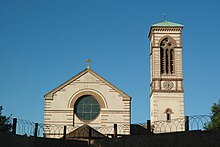
Sir Arthur William Blomfield was an English architect. He became president of the Architectural Association in 1861; a Fellow of the Royal Institute of British Architects in 1867 and vice-president of the RIBA in 1886. He was educated at Trinity College, Cambridge, where he studied Architecture.
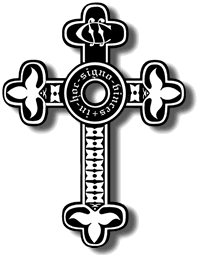
The Society of the Holy Cross is an international Anglo-Catholic society of male priests with members in the Anglican Communion and the Continuing Anglican movement, who live under a common rule of life that informs their priestly ministry and charism.
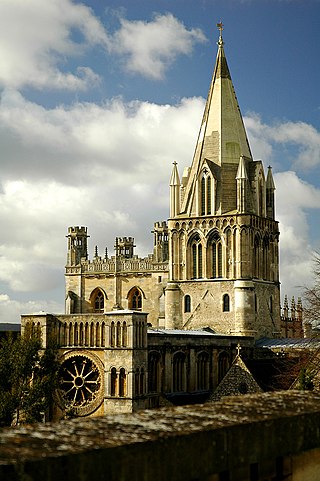
The Diocese of Oxford is a Church of England diocese that forms part of the Province of Canterbury. The diocese is led by the Bishop of Oxford, and the bishop's seat is at Christ Church Cathedral, Oxford. It contains more church buildings than any other diocese and has more paid clergy than any other except London.
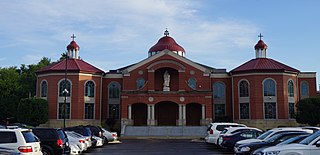
The Eparchy of St. Thomas Syro-Malabar Catholic of Chicago, also known as the St. Thomas Syro-Malabar Diocese of Chicago, is a Syro-Malabar Catholic Church ecclesiastical territory or eparchy of the Catholic Church in the United States. Its episcopal seat is the Mar Thoma Sleeha Cathedral in the episcopal see of Chicago in Illinois state.

Jericho is a historic suburb of the English city of Oxford. It consists of the streets bounded by the Oxford Canal, Worcester College, Walton Street and Walton Well Road. Located outside the old city wall, it was originally a place for travellers to rest if they had reached the city after the gates had closed. The name Jericho may have been adopted to signify this 'remote place' outside the wall. As of February 2021, the population of the Jericho and Osney wards was 6,995.
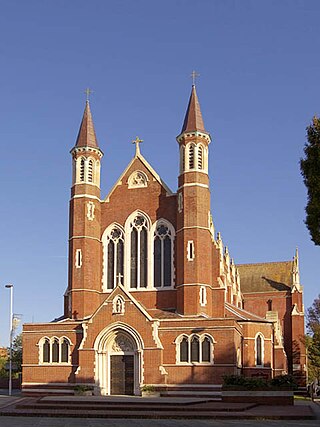
The Roman CatholicDiocese of Portsmouth is a Latin diocese of the Catholic Church that covers the Channel Islands as well as parts of England. The episcopal see is St John's Cathedral in Portsmouth and is headed by the Bishop of Portsmouth. The diocese is part of the metropolitan Province of Southwark, which covers all of the far South of England as well as the Channel Islands.
Charles Fuge Lowder was a priest of the Church of England. He was the founder of the Society of the Holy Cross, a society for Anglo-Catholic priests.

Thomas Combe was a British printer, publisher and patron of the arts. He was 'Printer to the University' at Oxford University Press, and was also a founder and benefactor of St Barnabas Church, near the Press in Jericho and close to Oxford Canal.

Richard William Enraght was an Irish-born Church of England priest of the late nineteenth century. He was influenced by the Oxford Movement and was included amongst the priests commonly called "Second Generation" Anglo-Catholics.

St Thomas the Martyr Church is a Church of England parish church of the Anglo-Catholic tradition, in Oxford, England, near Oxford railway station in Osney. It is located between Becket Street to the west and Hollybush Row to the east, with St Thomas Street opposite.
Frank Ernest Howard was an English architect who worked exclusively in the area of ecclesiastical furnishings and fittings.

St. Paul's Episcopal Church is a parish church in the Diocese of Iowa. The church is located in Durant, Iowa, United States. The church building and parish hall have been listed on the National Register of Historic Places since 1985.
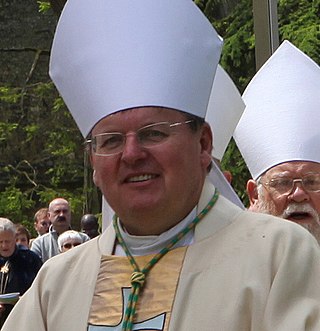
Norman Banks is a retired Anglican bishop. From 2011 until 2024, he was the Bishop of Richborough, the provincial episcopal visitor for the eastern half of the Church of England Province of Canterbury.

St Barnabas Bethnal Green is a late 19th-century church in Bow in London, England. It is an Anglican church in the Diocese of London. The church is at the junction of Roman Road and Grove Road in the Bow West ward of London Borough of Tower Hamlets.

St Alban the Martyr, Birmingham is a Grade II* listed Church of England parish church in the Anglican Diocese of Birmingham. It is dedicated to Saint Alban, the first British Christian martyr.

St Gabriel's Church is a Church of England parish church in Walsall, West Midlands. Its parish includes Fullbrook, Caldmore, Bescot, The Delves, Palfrey, and Tamebridge and Yew Tree.

St Clement's is a Church of England parish church in central Cambridge. The church is a Grade II* listed building.
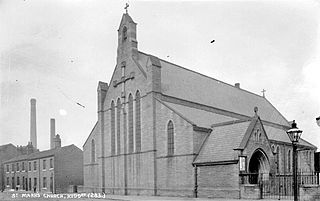
The former St Mark's Church, Old Leeds Road, Huddersfield, was an Anglican parish church in West Yorkshire, England. It was previously known as St Mark's, Leeds Road, before the road name was changed. This building was designed in 1886 by William Swinden Barber when the parish of St Peter's was split and a new building was required to accommodate a growing congregation. It was opened in 1887. Among the vicars posted in this benefice were the very popular Canon Percy Holbrook, the notoriously unfortunate Reverend Jonas Pilling who was involved in a standoff with his congregation for many years, the sociable Reverend Robert Alfred Humble who died in mysterious circumstances, and the eloquent preacher Reverend Joseph Miller, who had previously been a Congregational minister. The building was sold by the Church of England in 2001, and it has been converted into a block of offices.

Holy Trinity Church, also known as the Church of the Holy Trinity, is a Church of England parish church in the town of Reading in the English county of Berkshire. It is situated on the Oxford Road some 500 metres (1,600 ft) west of the town centre. It is a Grade II listed building.
Paul Richard Thomas SSC is a British Anglican bishop who has served as Bishop of Oswestry, a suffragan bishop in the Diocese of Lichfield and the provincial episcopal visitor for the western half of the Province of Canterbury since February 2023. From 2011, he was vicar of St James's Church, Paddington.
